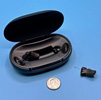Before I head out the door for a big Costco run, I always turn down my refrigerator and freezer temperatures. I know that once I load them up with room-temperature groceries, it’s going to take a while for everything to cool back down to a safe level. Samsung’s new AI Hybrid Cooling technology promises to solve that problem by blending traditional compressor-based cooling with a thermoelectric Peltier module. This dual system is optimized by AI algorithms that can predict usage patterns and adjust cooling settings based on real-time conditions.
Traditional refrigerators rely on compressors to regulate temperature, cycling on and off to maintain optimal conditions. While effective, compressors can be slow to respond to sudden temperature swings – like when a fridge door is left open or warm groceries are loaded in. Peltier cooling modules, on the other hand, use electricity to create temperature differences directly and are much quicker to react.

The downside of Peltier modules is that they are highly effective at precise cooling but are generally less energy-efficient than compressors for maintaining low temperatures over extended periods. Until now, this limitation has kept thermoelectric modules out of mainstream refrigerator designs. Samsung's innovation lies in harnessing the strengths of both technologies – compressors for sustained cooling and thermoelectric modules for quick, targeted adjustments. The result is a hybrid system that addresses the shortcomings of each approach.
Read more: KitchenAid's NITRO Carbon Steel Skillet: Less Rust, Less Fuss
While there hasn’t been third-party testing of compressor-thermoelectric cooling efficiency, the concept makes a lot of sense. Using the thermoelectric component to respond quickly to temperature changes while giving the compressor an extra boost seems like a logical and effective approach.
In addition to its cooling advancements, AI algorithms predict your family's usage patterns and adjusting cooling settings in real time. For example, when the refrigerator detects a sudden influx of warm air after restocking from a big grocery trip, the thermoelectric module kicks in to quickly stabilize temperatures. It would also know that my son likes to stand with the freezer and refrigerator doors open when he gets home from school at 4 PM while he's deciding on a snack and adjust its cooling accordingly.
Read more: Microwave Ovens with Inverter Technology Really Cook
Samsung will showcase its AI Hybrid Cooling technology next week at CES 2025 in Las Vegas. Refrigerators featuring this innovation are expected to hit the market later in 2025.
[Image credit: Samsung]
Suzanne Kantra founded Techlicious 15+ years ago and has been covering consumer technology for more than 20 years. She was the Technology Editor for Martha Stewart Living Omnimedia, where she hosted the radio show “Living with Technology," and served as Senior Technology Editor for Popular Science Magazine. She has been featured on CNN, CBS, and NBC.














